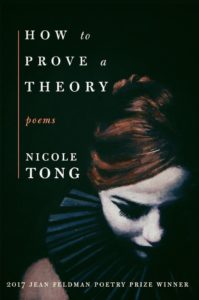Self-Portrait as Venus
After Sandro Botticelli
Oh, so this is the world?
Wind gods blowing over-
due vowels with rounding mouths.
Sky above, sea beneath, and I
am between. This is the world
divided: two people
with different wants.
One places delicate detail
of petals, narrates stories
always already in star. The other
moves the tide that rises, promises
to swallow me whole.
Gentle Obsessions
After Emily Dickinson
When I folded the memory
of your death into an accordion shape
and tossed it to sea, I was certain it would play
a hymn like the ones you loved. And you were right:
the soul knows how to sustain itself
despite submersion, to give up the land’s edge
lost to the flood until everything is the horizon.
When you said spring leaves only water
whole, did you mean the sky and ocean are
windows? When nothing can be tethered
to shore by phone line or otherwise,
which practices survive?

Wistful Theory
Johnson, Vermont
No hopeless field nearby, no whisper
moving through the body’s hull.
Today, silence. Even emptiness
yearns for something.
Today, a steep walk, my face lashed
by wind and snow. The bivouac of birds undone,
replaced by milkweed’s collapsed casket.
The moment before this landscape’s erasure
will be a prophetic sigh. No, it
will be the stillness of water’s fine lie.
Via Negativa
Let white light erase
the landscape until all
becomes snow or scrimshaw.
The present always wants
another passing between
worlds: more
than living and—
My body composes
its own sentence.
Tentatively starts
and stops. Stop
down: to allow less
light. Which is to say
gravity. There are ways
to contain a thing
without binding it
in twine.
How to Prove a Theory
For John
And on our second date you told the story
of your family in China, which you began
in jest, I have to have a son. You moved
food around your plate. Shared how your father,
the second born, felt birth order made his choices
less consequential until his older brother,
the opera star, died of appendicitis. How familial
attention shifted to him as if the singer
had never lived to intone a note. After, your father
became a Catholic priest in part because the vows
disallowed the children expected of him
as the only living son. Later, Communists came,
held your grandfather captive, demanded ransom
before taking the family home. The priest boarded
the last flight out of Beijing to San Francisco,
asylum granted, before settling in D.C. where he met
your mother, renounced his vows, fell in love,
and fathered two sons. But you have a brother!
I shouted as if problem-solving because then
you did. I loved you before the doctor’s warning,
Things with your brother are dire. Before Paul’s
final night when you spoke slowly as morphine’s drip.
To prove a theory of the beauty of this world,
acknowledge its cruelty: the brother lacking children
is less likely to be given a new heart so he’s fated
to spend two years choking as if drowning but remains
thankful for each night he falls asleep with his head
in your lap, for the bandages we wrap at the ankles
once edema takes hold. That night, you told me
your grandfather died before he got word your father
was a father, despite such an unlikelihood.
Then, when you were eleven you watched as his heart
stopped in front of you. You were sent to school
later that afternoon. It was April Fool’s Day. When
you told people your dad was dead, few believed you.
To prove a theory of fragility, you will master capacity:
to fill hallowed air with laughter, even after the hardest day
with the help of a book titled Terribly Offensive Jokes
Volume 1, discovering seven more in the set, recalling
Paul tell each line as if his own. And before you lead
our way home, you will pretend to drop the ashes
that had been his body as Paul would have done
to you. For a second, your lineage suspended,
its weight contained. And yet these generations are
mirrors for looking into. Only you remain. And yet.
All poems reprinted from How to Prove a Theory (Washington Writers Publishing House, 2017), with permission from the author. An earlier version of “Gentle Obsessions” appeared in Rust + Moth, Autumn 2014 issue.
Washington Writers Publishing House is a non-profit organization that has published over 50 volumes of poetry since 1973 and nearly a dozen volumes of fiction. The press sponsors an annual competition for writers living in the Washington-Baltimore area. WWPH is a cooperative, and winners of the annual competition become members of the collective, working on publicity, distribution, production and fundraising to continue the vitality and success of the press.
Nicole Tong is the author of How to Prove a Theory (Washington Writers Publishing House, 2017), winner of the Jean Feldman Poetry Prize. She is the recipient of fellowships from the Vermont Studio Center, the Virginia Center for the Creative Arts, and George Mason University, where she received her MFA. In 2016, she served an the inaugural writer-in-residence at Pope-Leighey House, a Frank Lloyd Wright property in Alexandria, VA. She is a recipient of the President's Sabbatical from Northern Virginia Community College, where she is a Professor of English. Her writing has appeared in American Book Review, Calyx, Cortland Review, and Yalobusha Review.